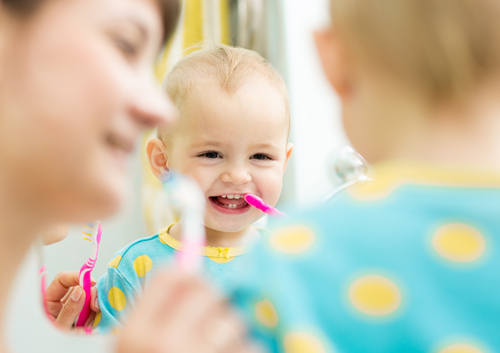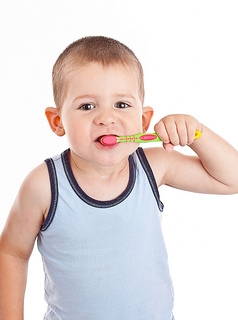August 2nd, 2023

Thanks for the question. The “blisters” you are referring to are actually a normal part of losing baby teeth. Sometimes when teeth start to come through, children experience some bleeding under the skin, which typically causes small blisters or bruises on your child’s gums. The blisters, bluish in color, will disappear once the tooth comes through, and the tooth itself will still come through as it should.
Even though they can look a little frightening at first, there is no treatment required to treat blisters, nor are these blisters preventable. In fact, our bodies do a great job of cleaning up the loose ends of baby tooth loss and permanent tooth emergence, and not too long after, it’s as if no blisters ever happened. It’s important to note, however, that these blisters should not be pricked or cut as doing so may cause an infection in your child’s mouth.
If you are worried about blisters or bruises in your child’s mouth, please give us a call at our convenient Fort Myers, FL office to schedule an appointment with Dr. Favalli. We especially encourage you to give us a call if your child has had one of these blisters for more than a month and the tooth has yet to come through.
July 26th, 2023

As a parent, it is your job to instill good dental habits in your kids, and this starts even earlier than you might realize. The American Academy of Pediatric Dentistry responds to the “when to start” question with a succinct “The sooner the better!”
From the time your baby is born, you should make sure that your child’s gums are regularly cleaned using water and a toothbrush made for infants. Once the first tooth erupts, you should visit the pediatric dentist for the first time. Dr. Favalli and our staff often recommend that if your child is a year old, but has yet to get the first tooth, you should bring your son or daughter to our Fort Myers, FL office for his or her initial dental care appointment.
Once your child’s teeth start to appear, you can begin brushing two times per day, using fluoride toothpaste. Choose a toothbrush made specifically for your child’s age group, and one with has soft bristles.
Only a small smear of toothpaste is needed if your child is under two years old. Once the child celebrates his or her second birthday, you can use a pea-sized amount of fluoridated toothpaste. Continue this practice until your child is five.
Of course, it is important that you monitor your child’s tooth brushing closely to help educate about proper techniques. Some young children might try to eat or swallow toothpaste, and this needs to be strongly discouraged. Be sure to teach proper rinsing and spitting behavior to round out your child’s early childhood tooth-care regimen.
For young kids, tooth brushing can be made into a fun event, and you can find a multitude of special toothbrushes that appeal to kids. There are even uniquely flavored and colored toothpastes that might encourage your child to get into the brushing game!
July 19th, 2023

Unfortunately, dental emergencies can sometimes be unavoidable among young children. The good news is Dr. Favalli can help you prepare in case you and your child find yourselves in any of the following situations.
Teething
Starting at about four months and lasting up to three years, your son or daughter may experience teething pain. It’s common for teething children to grow irritable and become prone to drooling due to tender gums. Give your child a cold teething ring or rub his or her gums with your finger to help relieve the discomfort.
Loss of Teeth
If a baby tooth is knocked out in an accident, bring your child to our Fort Myers, FL office to make sure damage hasn’t occurred in the mouth. Permanent teeth can sometimes grow in before baby teeth have fallen out. In this situation, Dr. Favalli should examine your child to make sure teeth are growing in properly. This can prevent serious issues from arising later in adulthood.
Gum Issues
Bleeding gums could mean several things. They may be an early sign of periodontal disease, which results from poor oral hygiene. Gums may also bleed if a youngster is brushing too hard or has suffered an injury to the gum tissue.
Rinse your child’s mouth with warm salt water and apply pressure to the area if bleeding continues. Don’t hesitate to contact our Fort Myers, FL office if you are concerned so we can schedule an appointment.
As a parent, you can provide the best education for your children on proper oral hygiene habits. If you some coaching, ask Dr. Favalli for tips during your next appointment.
July 12th, 2023

Our team at Lakes Park Children's Dentistry & Orthodontics would like to offer some tips regarding the sometimes dreaded task of brushing a toddler’s teeth.
Much of the trick lies in the positioning. Before you begin, make sure you are in a position of control. This protects both you and your child from injury. Consider how well you can see. If you cannot see clearly, the quality of brushing drops significantly. For instance, if your child is standing, you are likely to see only the bottom teeth well.
Our team finds that the best position for brushing and flossing a toddler is when your child is calm. Have your child lie down on his or her back with arms out to make a T. Sit down just above the head and lightly place your legs over your child’s arms. Using a circular motion, brush all sides of the teeth.
It may sound odd, but approaching the routine this way can make brushing time a cinch! After you’re done, give your child the toothbrush and let him or her have a turn. The benefit of doing the brushing and flossing first is that it gives an example, which your child is more likely to repeat when you’re done.
Different methods work best for different families and children. These practices need to be performed with kindness and care. Be gentle and make this time a happy learning time. Don’t forget to bring your child to our Fort Myers, FL office for regular dental checkups and cleanings. Dr. Favalli can advise you on ways to implement portions of these tips in a way that may work bests for you and your child.






 Back to Top
Back to Top